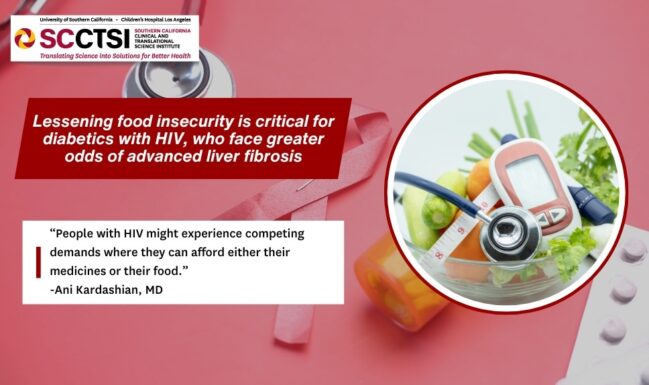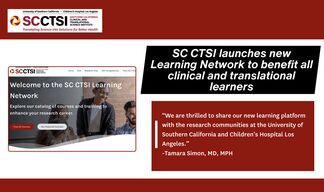Lessening food insecurity is critical for people with diabetes and HIV, who face greater odds of advanced liver fibrosis
SC CTSI award jump-started a clinician’s research career on social factors exacerbating liver disease
Most chronic liver diseases follow a progression. Fatty deposits increase in liver tissue. These deposits cause repeated inflammation that the liver repairs while leaving scars. Such scarring, called fibrosis, blocks liver blood flow and can kill healthy cells and cause more scarring. People with HIV are especially vulnerable as chronic liver disease is a leading non-AIDS-related cause of their mortality.
Yet a subset of people with HIV and liver fibrosis—people with diabetes—have less fat in the liver but more scarring than non-diabetics, according to a prospective multicenter cohort study of 654 adults with HIV, recently published in the journal Hepatology.
The authors hypothesize that chronic hunger or food insecurity could be interacting with diabetes and HIV to develop liver fibrosis without the fatty deposit stage.
“Food insecurity and food quality could play a major role,” said Ani Kardashian, MD, the first author and an assistant professor of medicine at the Keck School of Medicine of USC. She is in her third year of a KL2 Mentored Career Development award from Southern California Clinical and Translational Science Institute (SC CTSI).

The authors found that nearly one-third of study participants and 44% of those with advanced fibrosis are food insecure, which is a much higher prevalence rate than among the general population.
Food insecurity was associated with significantly greater odds of advanced fibrosis among study participants with HIV and diabetes, but not among non-diabetics. Participants with diabetes who were food insecure had more fibrosis than those with diabetes who were food secure.
“People with HIV might experience competing demands where they can afford either their medicines or their food,” Kardashian said. “They are marginalized and may have less access to food. Another explanation is that people with diabetes, HIV and food insecurity may have less visceral fat depositing in the liver.”
Yet another hypothesis is that food insecurity among diabetics with HIV could accelerate further dysfunction of the immune system.
“There could be more HIV-related immune activation, leading to worse virologic suppression and more systemic inflammation, which could mean less fat but more scarring in the liver,” Kardashian added.
The authors recommend that clinicians consider screening for HIV patients with food insecurity and referring them to case managers who can link them with community food assistance programs.
Kardashian credits her KL2 fellowship for training and guidance during her research into food insecurity, liver disease outcomes and people with HIV.
The KL2 Program provides protected research time and enables scholars to conduct multidisciplinary clinical research projects. During her KL2 award period, Kardashian is pursuing an MS in Clinical, Biomedical, and Translational Investigations.
“Dr. Kardashian’s research and progress is an excellent example of work in the translational paradigm. She has committed herself to developing strong analytic skills and producing this meaningful work that highlights needed policy and clinical guideline changes to improve the health and care of diverse populations,” said Elizabeth Burner, MD, MPH, associate professor of clinical emergency medicine and interim KL2 program director.
Kardashian has found tremendous value in the program.
“The KL2 award has changed the course of my career,” said Kardashian. “The award allows clinicians to develop the skill set and the tools to transition to a research-focused path. Many institutions don’t support such transitions the way USC does.”
She also credits SC CTSI staff with providing qualitative research guidance, informatics support, training opportunities and collaborations with the Biostatistics, Epidemiology and Research Design (BERD) group.
“They’ve all been super helpful,” Kardashian added. “The KL2 program has given me protected time and training, and with the biostatistical support of SC CTSI, I’ve received additional grants to support my research interests. I'm extremely grateful for that opportunity.”



